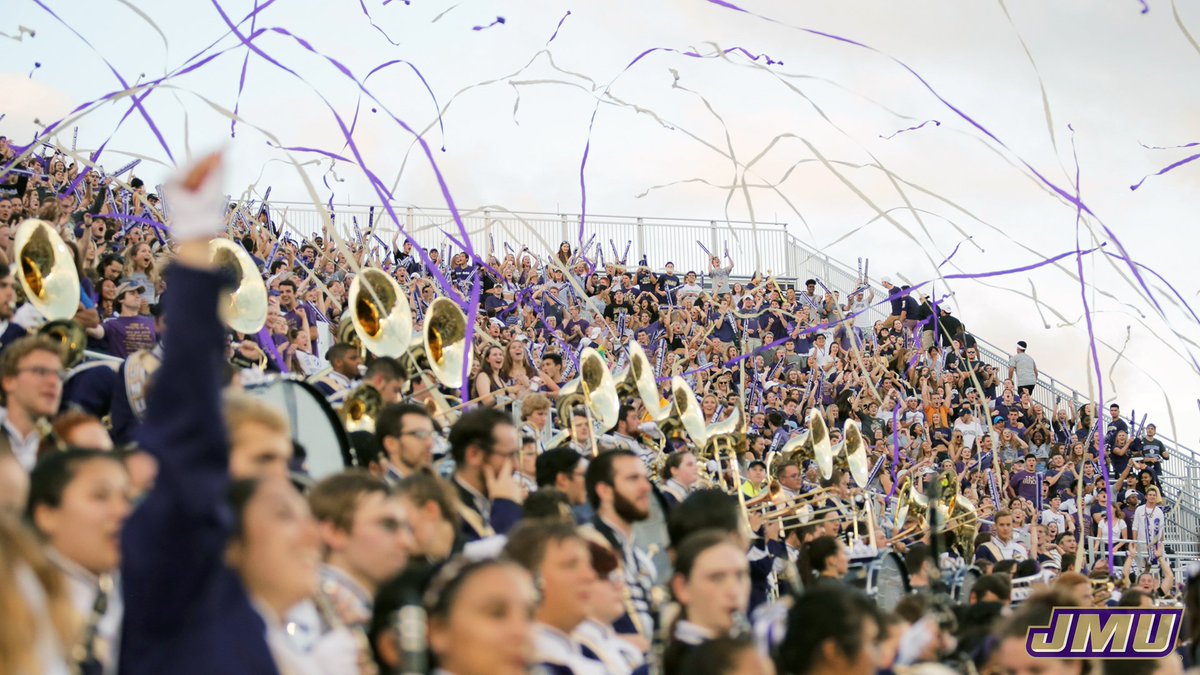Image courtesy of JMU Athletics Communications
By Bennett Conlin
With news surfacing that UConn expects to leave the American Athletic Conference to return to the Big East, JMU fans got excited. If UConn leaves the AAC in basketball, it’s very likely the Huskies will also leave the AAC in football, according to reports. This opens up a spot in the conference for another team to join.
For some JMU fans, they interpreted this news as the first domino falling in JMU’s master plan to join the AAC. While the news may put JMU into the conversation to join the American, there are a handful of other options the conference will consider to fill its need — adding Army in football and VCU in basketball is one that’s been cited in many media reports.
As I scrolled through Twitter throughout Saturday, I found quite a few wild claims about JMU’s likelihood of moving into the AAC, or another FBS conference. After a day of digesting those hot takes, I’m ready to share what I hope are rational thoughts about the situation.
Claim: JMU isn’t even going to be considered to join the AAC, and the UConn move means nothing.
Voice of Reason: Most of us know very little about what schools the AAC has in mind as potential replacements for UConn, but it’s probably inaccurate to say that JMU isn’t at least slightly on the radar. JMU certainly isn’t the most likely option to join the league, but it isn’t completely out of the picture.
The Dukes, especially with the addition of 22 scholarships, are an immediate upgrade over UConn on the football field. JMU’s women’s basketball teams adds value to the conference, although there’s no way the AAC can salvage the loss of UConn women’s basketball. While men’s basketball would be among the worst AAC teams upon joining the conference, there’s reason for optimism. With a new arena on the way and a talented team returning this year, JMU could very well be a CAA contender this year and a middle-of-the-pack AAC squad in a couple seasons. Additionally, JMU has the financial capability to make the move.
Claim: JMU’s Olympic sports make it the best option to join the AAC.
Voice of Reason: There’s some validity to this claim, as JMU is one of the strongest candidates to join the AAC in terms of total athletic performance. The Dukes’ men’s soccer team, women’s lacrosse team and softball team bring national relevance to the table. Women’s soccer, field hockey and volleyball also have proven histories of success.
Despite strong Olympic sports performance, conference realignment tends to be dominated by football and men’s basketball. While JMU boasts a strong football program, the men’s basketball team’s on-court performance is weak. Is JMU’s football and basketball combination more enticing than adding Army in football and VCU in basketball or Old Dominion or Appalachian State in all sports?
Claim: JMU’s geographic and academic fit make it the perfect school to join the AAC.
Voice of Reason: Theoretically, JMU could help the AAC gain traction in the Virginia and Washington D.C. markets, but JMU isn’t the only school that makes sense in terms of its academic and geographic fit.
Rumors have circulated that the AAC could add Army in football, the Black Knights have built a strong program in recent years, and VCU in basketball. Other rumors have the conference adding a team like Appalachian State across the board. The Mountaineers have a quality football program, although its overall athletic strength falls a bit below JMU’s. Their men’s basketball program just posted a woeful 11-21 mark in 2018, and the school’s Olympic sports don’t pose the same national title threat as a few of JMU’s programs.
Regardless, JMU isn’t the perfect option to join the AAC, as there really isn’t a perfect option for the conference. The Army-VCU combination makes sense, though. Even Old Dominion can make a case to make the jump from C-USA to the AAC. JMU deserves to be in the conversation, but the Dukes aren’t close to leading the discussion.
Claim: If JMU had any chance of joining the AAC, why would Everett Withers and Mike Houston have left so quickly for Group of 5 FBS jobs?
Voice of Reason: There was no telling when conference realignment dominoes would start falling. Both Withers and Houston have professional goals, and their decisions to join FBS programs doesn’t mean much of anything regarding JMU’s chances to move up. Houston loves the Carolina area and likely wants to lead a Power 5 program in the next 5-10 years. Instead of waiting to see what JMU might do, he jumped to a solid AAC program in North Carolina with a chance to enhance his resume and lead a team to FBS relevance. When he was quickly passed over for the North Carolina opening, it became clear he needed a Group of 5 job before becoming a Power 5 coach.
JMU’s new head man, Curt Cignetti, has decades of FBS coaching experience and would be well suited for a move up. Mike Houston’s decision reflects his professional goals more than JMU’s likelihood of joining the FBS.
Claim: If JMU moves up, they’ll lose all chance of competing for championships.
Voice of Reason: This is an incredibly near-sighted view of the situation. In the short-term, JMU football would not be the favorite to win the AAC or national title. (Obviously.) Men’s basketball would likely take at least a few years to get into the conference title hunt and NCAA Tournament at-large discussion. Every program across the board would have a tougher time winning conference titles, but that’s because the AAC is a better conference than the CAA.
Teams like softball, women’s basketball and lacrosse would benefit from a better conference strength of schedule. Playing better competition could help softball earn a national seed, and women’s basketball wouldn’t need a conference tournament title to make the Big Dance. The same would go for men’s basketball. By playing better teams and reducing the likelihood of winning a conference title every season, JMU could be setting itself up for more national relevance.
Additionally, most reports suggest the College Football Playoff will eventually grow to eight teams. Many believe one of those eight teams will be an automatic qualifier from the Group of 5. If that happens, JMU football winning the AAC could mean a spot in College Football Playoff alongside teams like Alabama and Clemson.
On the other hand, JMU football could become like Old Dominion and flounder in Group of 5 mediocrity. Given the JMU’s athletic resources and current on-field success, it’s more likely the Dukes fall somewhere in between ODU and a CFP contender like UCF. It could take well over a decade for JMU to become a fringe national title contender in the FBS. It may never happen. But the Dukes have the resources and commitment to football to compete for AAC titles after a few years in the league. The other programs would likely increase their chance at competing for national titles by joining the AAC.
Claim: Losing the FCS playoffs would be a big blow. Does JMU really want to play in a meaningless December bowl game in front of 37 fans?
Voice of Reason: JMU doesn’t want to play in meaningless bowl games. Nobody wants to play in meaningless bowl games. The FCS playoffs are a fantastic display of college football, but the excitement varies greatly throughout the playoffs.
Was playing Colgate on ESPN3 a better option than playing in a random bowl game? Probably, but it’s not as clear cut as some fans believe. Giving up the FCS playoffs would hurt, but the reward of being able to schedule teams like Virginia, Virginia Tech, Old Dominion and Appalachian State during the nonconference schedule could outweigh a lackluster bowl appearance. And, if JMU finds success in the FBS, it could be playing in major bowl games against Power 5 opponents on national TV.
Again, the truth falls somewhere in between the two sides. If JMU stays in the FCS, it will likely contend for national titles on a regular basis. It will also settle for one FBS matchup per season and other nonconference snoozers with teams like Robert Morris, Morehead State and Norfolk State. The Dukes will trade nonconference excitement, and even some conference excitement, for the thrill of chasing down a national title during an awesome playoff format.
Claim: JMU would give up many of its historic rivalries if it joined the AAC.
Voice of Reason: Yes and no. While the Dukes likely wouldn’t play Richmond, Delaware and William & Mary in football on an annual basis, the Dukes could actually regain a few of its older rivalries, while also creating new rivalries.
In football, JMU could schedule Old Dominion, Appalachian State and even teams like Virginia Tech. West Virginia and North Carolina may become fairly regular nonconference foes. The conference slate could include games against East Carolina and former head coach Mike Houston, assuming he stays at ECU for a few years.
In basketball, JMU could still schedule teams like William & Mary and Delaware, while also having a better chance at consistently playing teams like Old Dominion, VCU, Virginia and other in-state programs during the nonconference schedule. While playing teams like Tulsa during the conference season wouldn’t be quite the same as a matchup with William & Mary, would losing games against UNCW, Towson and Drexel really upset anyone?
Overall, JMU could drift away from frequent battles with William & Mary and Delaware, which would be a loss for fans. JMU could rekindle rivalries with Old Dominion and VCU, though.
The bottom line
There are pros and cons to JMU joining the AAC, and fans tend to disagree on major discussions like this. With rumors about UCF and/or Houston potentially joining the Big 12 in coming years, there’s a chance the AAC has multiple open spots in the next few years. Given JMU’s commitment to its athletic facilities and the recent FloSports TV deal, it’s hard to imagine the administration being content in the CAA. If the right opportunity presents itself, JMU will likely attempt to make the jump. But will the AAC ever set its sights on JMU? That remains to be seen.


Leave a Reply